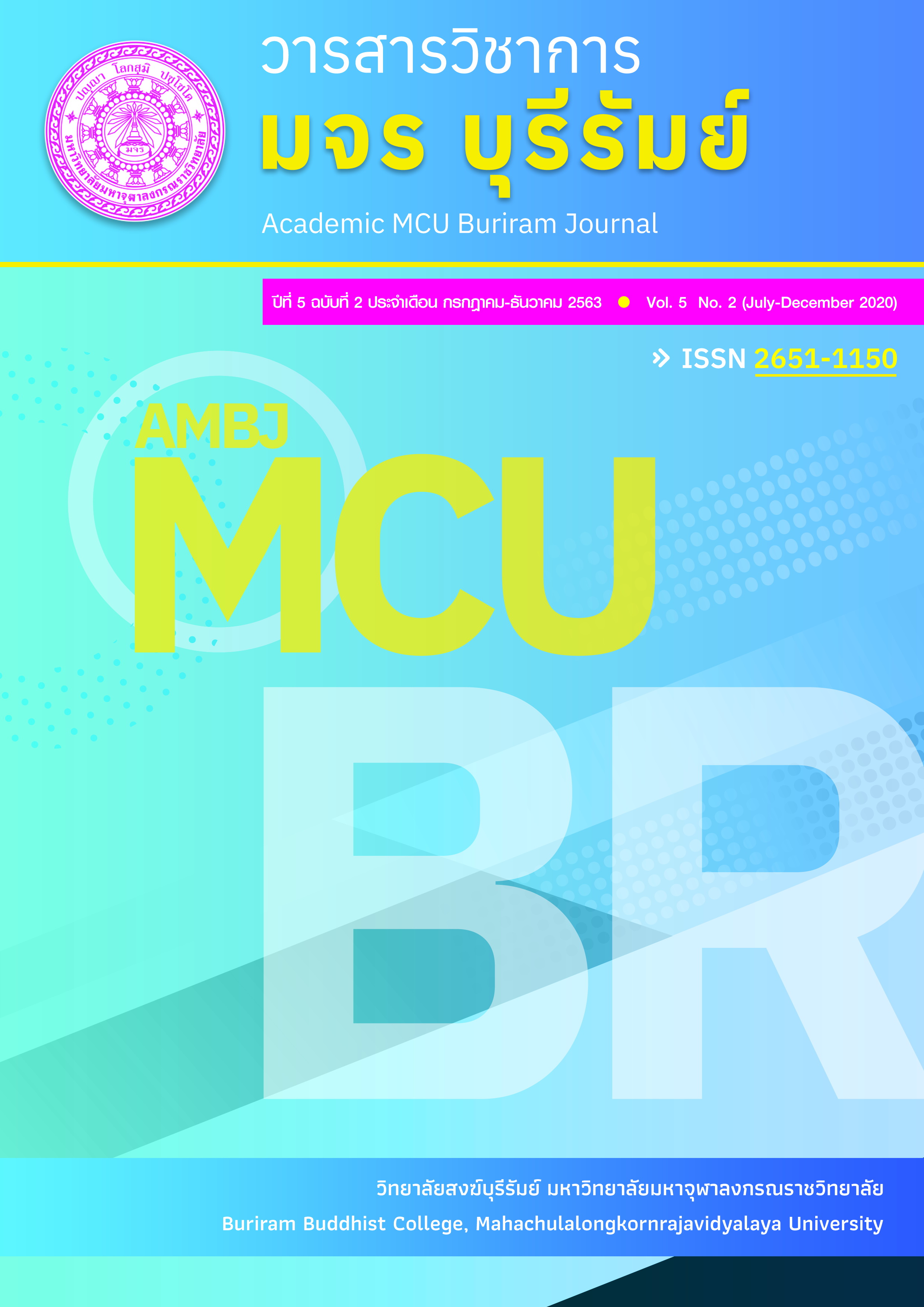Organizational Culture that Promoting Good Management of the Thai Bureaucracy
Keywords:
Organizational Culture, Good Management, Thai BureaucracyAbstract
The bureaucratic system is a system that contains activities related to the operation of the state involving many parties these include the State Department, which plays a role in making public services more inclusive, fair, and responsive to the needs of the people. And the People's Party, which is the recipient of public services under the rules Formal regulations and procedures, with the aim is to benefit the people. Making the public administration system to achieve the achievement of that state mission There is a need for good management characteristics in addition to the need for administrative resources There are also important factors affecting the success of public administration, namely factors that are related to the creation of an organizational culture that contributes to the development of the administrative system. The government shall have characteristics of good management, which includes an ethical organizational culture. Desirable culture and values of government organizations and the culture of the thai government organization for excellence
Conditions for administrative reform were set. In accordance with the principles of good governance the principles of good governance consist of 6 principles, consisting of 1) the rule of law that aims to protect rights and freedoms by having a fair law is applicable Equal law No discrimination there is a framework for action that respects the rights and liberties of the people. 2) transparency principles By revelation Straightforward and easy to understand There is transparency in all aspects of management such as having a clear work system. Giving information to outside society and past performance 3) Moral principles are Standards of right or wrong conduct Appropriate or unreasonable the core of virtue is free from discipline. Free from breaking the law and free from breaching professional standards. 4) Principles of participation. Open to public opinions Are planned together Able to participate and more importantly Opportunity to be examined Reflected. To be responsible for the public 5) the principle of responsibility they are responsible for the performance of their duties that have been achieved according to the specified goals, with regard to the benefits of their participation and the management of resources for maximum benefit. 6) Value principles this is to protect the environment and have the ability to compete with other agencies outside.
References
กริช สืบสนธิ์. (2540). วัฒนธรรมและการสื่อสารในองค์การ. กรุงเทพฯ: สำนักพิมพ์แห่งจุฬาลงกรณ์ มหาวิทยาลัย.
กิตติพงษ์ เกียรติวัชรชัย. (2559). กฎหมายว่าด้วยการบริหารราชการแผ่นดิน. ในเอกสารการสอนชุดวิชาหลัก กฎหมายเกี่ยวกับการบริหารราชการไทย. (หน่วยที่ 2). นนทบุรี: มหาวิทยาลัยสุโขทัยธรรมาธิราช.
โกวิทย์ พวงงาม. (2555). การปกครองท้องถิ่นไทย หลักการและมิติใหม่ในอนาคต. พิมพ์ครั้งที่ 8. กรุงเทพฯ: วิญญูชน.
ติน ปรัชญพฤทธิ์. (2535). ศัพท์รัฐประศาสนศาสตร์. กรุงเทพฯ: สำนักพิมพ์แห่งจุฬาลงกรณ์มหาวิทยาลัย.
_________. (2538). ศัพท์รัฐประศาสนศาสตร์. (พิมพ์ครั้งที่ 3). กรุงเทพฯ: โรงพิมพ์จุฬาลงกรณ์มหาวิทยาลัย.
ปภาวดี ดุลยจินดา. (2541). หลักการทั่วไปเกี่ยวกับการบริหารราชการ. ในเอกสารการสอนชุดวิชาการบริหารราชการไทย. (หน่วยที่ 1). พิมพ์ครั้งที่ 16. นนทบุรี: มหาวิทยาลัยสุโขทัยธรรมาธิราช.
รังสรรค์ ประเสริฐศรี. (2551). แนวคิดและหลักการเกี่ยวกับการบริหารราชการ. ในเอกสารการสอนชุดวิชาระบบบริหารราชการไทย. (หน่วยที่ 1). พิมพ์ครั้งที่ 5. นนทบุรี: มหาวิทยาลัยสุโขทัยธรรมาธิราช.
วิชชุกร นาคธน. (2550). การปกครองท้องถิ่นไทย. พระนครศรีอยุธยา: มหาวิทยาลัยราช ภัฏพระนครศรีอยุธยา.
วิเชียร วิทยอุดม. (2551). แนวคิดรัฐประศาสนศาสตร์และทฤษฎีระบบราชการ. กรุงเทพฯ: ธีระฟิล์มและไซเท็ก.
ศิริวรรณ เสรีรัตน์ สมชาย หิรัญกิตติ ธนวรรณ ตั้งสินทรัพย์ศิริ. (2550). การจัดการและพฤติกรรมองค์การ. กรุงเทพฯ: ธีระฟิล์มและไซเทกซ์.
สถาบันและพัฒนาข้าราชการพลเรือน. (2545). วัฒนธรรมและค่านิยมใหม่ในการทำงาน. กรุงเทพฯ: สำนักงานคณะกรรมการข้าราชการพลเรือน.
สถาพร วิชัยรัมย์. (2559). เอกสารประกอบการสอนวิชาระบบบริหารราชการไทย. บุรีรัมย์: มหาวิทยาลัยราชภัฏบุรีรัมย์.
สมยศ นาวีการ. (2540). การบริหารและพฤติกรรมองค์การ. กรุงเทพฯ: บรรณกิจ.
สมาน รังสิโยกฤษฎ์. (2546). ระบบบริหารราชการไทย: อดีต ปัจจุบัน และอนาคต. พิมพ์ ครั้งที่ 2. กรุงเทพฯ: บรรณกิจ 1991.
เสน่ห์ จุ้ยโต. (2559). การกำหนดวัฒนธรรมองค์การ. ในเอกสารการสอนชุดวิชาการจัดการเชิงกลยุทธในภาครัฐกิจ. (หน่วยที่7). นนทบุรี: มหาวิทยาลัยสุโขทัยธรรมาธิราช.
อวยชัย ชะบา. (2538). ภาวะผู้นำและวัฒนธรรมองค์การ. ในเอกสารการสอนชุดวิชาพฤติกรรมการบริหารองค์การสาธารณะ. นนทบุรี: มหาวิทยาลัยสุโขทัยธรรมาธิราช.
อาวุธ วรรณวงศ์. (2551). กระบวนทัศน์ในการบริหารงานภาครัฐ. ในประมวลสาระชุดวิชาการบริหารงานภาครัฐ. (หน่วยที่ 11). นนทบุรี: มหาวิทยาลัยสุโขทัยธรรมาธิราช.
Bernstien, S. J. and Hara, P. O. (1979). Public Administration: Organization, People and Public Policy. New York: Harper and Row.
Dimock, M. E. (1969). Public Administration. (4thed). New York: Holt, Rinehart and Winston.
Nigro, F. A., and Nigro, L. G. (1984). Modern Public Administration. New York: Harper and Row.
Schein, E.H. (1992). Coming to a new awareness of Organization Culture. New York: McGraw-Hill.
Simon, H. A. (1956). Public Administration. New York: Knopf.
Tyagi, A. R. (1975). Public Administration (Principles and Practice). Delhi: Atma Ram and Sons.
Downloads
Published
How to Cite
Issue
Section
License
ทัศนะและความคิดเห็นที่ปรากฏในบทความวารสารฉบับนี้ถือเป็นความรับผิดชอบของผู้เขียนบทความนั้น ไม่ถือเป็นทัศนะและความรับผิดชอบของบรรณาธิการ





